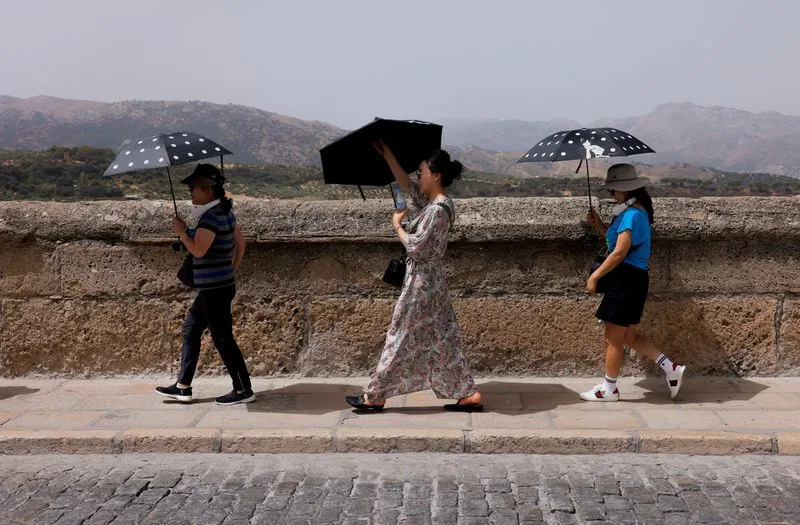Why a Second Trump Presidency May Be More Radical Than His First
Charlie Savage, Jonathan Swan and Maggie Haberman – December 4, 2023

Donald Trump has long exhibited authoritarian impulses, but his policy operation is now more sophisticated, and the buffers to check him are weaker.
In the spring of 1989, the Chinese Communist Party used tanks and troops to crush a pro-democracy protest in Beijing’s Tiananmen Square. Most of the West, across traditional partisan lines, was aghast at the crackdown that killed at least hundreds of student activists. But one prominent American was impressed.
“When the students poured into Tiananmen Square, the Chinese government almost blew it,” Donald J. Trump said in an interview with Playboy magazine the year after the massacre. “Then they were vicious, they were horrible, but they put it down with strength. That shows you the power of strength. Our country is right now perceived as weak.”
It was a throwaway line in a wide-ranging interview, delivered to a journalist profiling a 43-year-old celebrity businessman who was not then a player in national politics or world affairs. But in light of what Mr. Trump has gone on to become, his exaltation of the ruthless crushing of democratic protesters is steeped in foreshadowing.
Mr. Trump’s violent and authoritarian rhetoric on the 2024 campaign trail has attracted growing alarm and comparisons to historical fascist dictators and contemporary populist strongmen. In recent weeks, he has dehumanized his adversaries as “vermin” who must be “rooted out,” declared that immigrants are “poisoning the blood of our country,” encouraged the shooting of shoplifters and suggested that the former chairman of the Joint Chiefs of Staff, Mark Milley, deserved to be executed for treason.
As he runs for president again facing four criminal prosecutions, Mr. Trump may seem more angry, desperate and dangerous to American-style democracy than in his first term. But the throughline that emerges is far more long-running: He has glorified political violence and spoken admiringly of autocrats for decades.

As a presidential candidate in July 2016, he praised the former Iraqi dictator Saddam Hussein as having been “so good” at killing terrorists. Months after being inaugurated, he told the strongman leader of the Philippines, Rodrigo Duterte, that his brutal campaign of thousands of extrajudicial killings in the name of fighting drugs was “an unbelievable job.” And throughout his four years in the Oval Office, Mr. Trump blew through boundaries and violated democratic norms.
What would be different in a second Trump administration is not so much his character as his surroundings. Forces that somewhat contained his autocratic tendencies in his first term — staff members who saw their job as sometimes restraining him, a few congressional Republicans episodically willing to criticize or oppose him, a partisan balance on the Supreme Court that occasionally ruled against him — would all be weaker.
As a result, Mr. Trump’s and his advisers’ more extreme policy plans and ideas for a second term would have a greater prospect of becoming reality.
A Radical Agenda
To be sure, some of what Mr. Trump and his allies are planning is in line with what any standard-issue Republican president would most likely do. For example, Mr. Trump would very likely roll back many of President Biden’s policies to curb carbon emissions and hasten the transition to electric cars. Such a reversal of various rules and policies would significantly weaken environmental protections, but much of the changes reflect routine and longstanding conservative skepticism of environmental regulations.
Other parts of Mr. Trump’s agenda, however, are aberrational. No U.S. president before him had toyed with withdrawing from NATO, the United States’ military alliance with Western democracies. He has said he would fundamentally re-evaluate “NATO’s purpose and NATO’s mission” in a second term.
He has said he would order the military to attack drug cartels in Mexico, which would violate international law unless its government consented. It most likely would not.
He would also use the military on domestic soil. While it is generally illegal to use troops for domestic law enforcement, the Insurrection Act allows exceptions. After some demonstrations against police violence in 2020 became riots, Mr. Trump had an order drafted to use troops to crack down on protesters in Washington, D.C., but didn’t sign it. He suggested at a rally in Iowa this year that he intends to unilaterally send troops into Democratic-run cities to enforce public order in general.
“You look at any Democrat-run state, and it’s just not the same — it doesn’t work,” Mr. Trump told the crowd, calling cities like New York, Chicago, Los Angeles and San Francisco crime dens. “We cannot let it happen any longer. And one of the other things I’ll do — because you’re supposed to not be involved in that, you just have to be asked by the governor or the mayor to come in — the next time, I’m not waiting.”
Mr. Trump’s plans to purge undocumented immigrants include sweeping raids, huge detention camps, deportations on the scale of millions per year, stopping asylum, trying to end birthright citizenship for babies born on U.S. soil to undocumented parents and invoking the Insurrection Act near the southern border to also use troops as immigration agents.

Mr. Trump would seek to expand presidential power in myriad ways — concentrating greater authority over the executive branch in the White House, ending the independence of agencies Congress set up to operate outside of presidential control and reducing civil service protections to make it easier to fire and replace tens of thousands of government workers.
More than anything else, Mr. Trump’s vow to use the Justice Department to wreak vengeance against his adversaries is a naked challenge to democratic values. Building on how he tried to get prosecutors to go after his enemies while in office, it would end the post-Watergate norm of investigative independence from White House political control.
In all these efforts, Mr. Trump would be backed in a second term by a well-funded outside infrastructure. In 2016, conservative think tanks were bastions of George W. Bush-style Republicanism. But new ones run by Trump administration veterans have sprung up, and the venerable Heritage Foundation has refashioned itself to stay in step with Trumpism.
A coalition has been drawing up America First-style policy plans, nicknamed Project 2025. (Mr. Trump’s campaign has expressed appreciation but said only plans announced by him or his campaign count.) While some proposals under development in such places would advance longstanding Republican megadonor goals, such as curbing regulations on businesses, others are more tuned to Mr. Trump’s personal interests.
The Center for Renewing America, for example, has published a paper titled “The U.S. Justice Department Is Not Independent.” The paper was written by Jeffrey Clark, whom Mr. Trump nearly made acting attorney general to aid his attempt to subvert the election and is facing criminal charges in Georgia in connection with that effort.
Asked for comment, a spokesman for Mr. Trump did not address specifics but instead criticized The New York Times while calling Mr. Trump “strong on crime.”
Weakened Guardrails
Even running in 2016, Mr. Trump flouted democratic norms.
He falsely portrayed his loss in the Iowa caucuses as fraud and suggested he would treat the results of the general election as legitimate only if he won. He threatened to imprison Hillary Clinton, smeared Mexican immigrants as rapists and promised to bar Muslims from entering the United States. He offered to pay the legal bills of any supporters who beat up protesters at his rallies and stoked hatred against reporters covering his events.
In office, Mr. Trump refused to divest from his businesses, and people courting his favor booked expensive blocks of rooms in his hotels. Despite an anti-nepotism law, he gave White House jobs to his daughter and son-in-law. He used emergency power to spend more on a border wall than Congress authorized. His lawyers floated a pardon at his campaign chairman, whom Mr. Trump praised for not “flipping” as prosecutors tried unsuccessfully to get him to cooperate as a witness in the Russia inquiry; Mr. Trump later did pardon him.

But some of the most potentially serious of his violations of norms fell short of fruition.
Mr. Trump pressured the Justice Department to prosecute his adversaries. The Justice Department opened several criminal investigations, from the scrutiny of former Secretary of State John Kerry and of the former F.B.I. director James B. Comey Jr. to the attempt by a special counsel, John Durham, to find a basis to charge Obama-era national security officials or Mrs. Clinton with crimes connected to the origins of the Russia investigation. But to Mr. Trump’s fury, prosecutors decided against bringing such charges.
And neither effort for which he was impeached succeeded. Mr. Trump tried to coerce Ukraine into opening a criminal investigation into Mr. Biden by withholding military aid, but it did not cooperate. Mr. Trump sought to subvert his 2020 election loss and stoked the Capitol riot, but Vice President Mike Pence and congressional majorities rejected his attempt to stay in power.
There is reason to believe various obstacles and bulwarks that limited Mr. Trump in his first term would be absent in a second one.
Some of what Mr. Trump tried to do was thwarted by incompetence and dysfunction among his initial team. But over four years, those who stayed with him learned to wield power more effectively. After courts blocked his first, haphazardly crafted travel ban, for example, his team developed a version that the Supreme Court allowed to take effect.
Four years of his appointments created an entrenched Republican supermajority on the Supreme Court that most likely would now side with him on some cases that he lost, such as the 5-to-4 decision in June 2020 that blocked him from ending a program that shields from deportation certain undocumented people who had been brought as children and grew up as Americans.
Republicans in Congress were often partners and enablers — working with him to confirm judges and cut corporate taxes, while performing scant oversight. But a few key congressional Republicans occasionally denounced his rhetoric or checked his more disruptive proposals.
In 2017, then-Senator Bob Corker rebuked Mr. Trump for making reckless threats toward North Korea on Twitter, and then-Senator John McCain provided the decisive vote against Mr. Trump’s push to rescind, with no replacement plan, a law that makes health insurance coverage widely available.
It is likely that Republicans in Congress would be even more pliable in any second Trump term. The party has become more inured to and even enthusiastic about Mr. Trump’s willingness to cross lines. And Mr. Trump has worn down, outlasted, intimidated into submission or driven out leading Republican lawmakers who have independent standing and demonstrated occasional willingness to oppose him.
Mr. McCain, who was the 2008 G.O.P. presidential nominee, died in 2018. Former Representative Liz Cheney, who voted to impeach Mr. Trump for inciting the Jan. 6, 2021, riot and helped lead the committee that investigated those events, lost her seat to a pro-Trump primary challenger. Senator Mitt Romney, the 2012 Republican presidential nominee and the only G.O.P. senator who voted to convict Mr. Trump at his first impeachment trial, is retiring.

Fear of violence by Trump supporters also enforces control. In recent books, both Mr. Romney and Ms. Cheney said that Republican colleagues, whom they did not name, told them they wanted to vote against Mr. Trump in the Jan. 6-related impeachment proceedings but did not do so out of fear for their and their families’ safety.
Personnel Is Policy
Perhaps the most important check on Mr. Trump’s presidency was internal administration resistance to some of his more extreme demands. A parade of his own former high-level appointees has since warned that he is unfit to be president, including a former White House chief of staff, John F. Kelly; former defense secretaries Jim Mattis and Mark T. Esper; the former national security adviser John R. Bolton; former Attorney General William P. Barr; and others.
Mr. Trump in turn has denounced them all as weak, stupid and disloyal. He has privately told those close to him that his biggest mistakes concerned the people he appointed, in particular his choices for attorney general. The advisers who have stuck with him are determined that if he wins a new term, there will be no officials who intentionally stymie his agenda.
In addition to developing policy papers, the coalition of think tanks run by people aligned with Mr. Trump has been compiling a database of thousands of vetted potential recruits to hand to a transition team if he wins the election. Similar efforts are underway by former senior Trump administration officials to prepare to stock the government with lawyers likely to find ways to bless radical White House ideas rather than raising legal objections.
Such staffing efforts would build on a shift in his final year as president. In 2020, Mr. Trump replaced advisers who had sought to check him and installed a young aide, John McEntee, to root out further officials deemed insufficiently loyal.
Depending on Senate elections, confirming particularly contentious nominees to important positions might be challenging. But another norm violation Mr. Trump gradually developed was making aggressive use of his power to temporarily fill vacancies with “acting” heads for positions that are supposed to undergo Senate confirmation.
In 2020, for example, Mr. Trump made Richard Grenell — a combative Trump ally and former ambassador to Germany — acting director of national intelligence. Two prior Trump-era intelligence leaders had angered Mr. Trump by defending an assessment that Russia had covertly tried to help his 2016 campaign and by informing Democratic leaders it was doing so again in 2020. Mr. Grenell instead won Mr. Trump’s praise by using the role to declassify sensitive materials that Republicans used to portray the Russia investigation as suspicious.

After Mr. Trump left office, there were many proposals to codify into law democratic norms he violated. Ideas included tightening limits on presidents’ use of emergency powers, requiring disclosure of their taxes, giving teeth to a constitutional ban on outside payments and making it harder to abuse their pardon power and authority over prosecutors.
In December 2021, when Democrats still controlled the House, it passed many such proposals as the Protecting Our Democracy Act. Every Republican but one — then-Representative Adam Kinzinger, who was retiring after having voted to impeach Mr. Trump after the Jan. 6 riot — voted against the bill, which died in the Senate.
The debate on the House floor largely played out on a premise that reduced its urgency: Mr. Trump was gone. Democrats argued for viewing the reforms as being about future presidents, while Republicans dismissed it as an unnecessary swipe at Mr. Trump.
“Donald Trump is — unfortunately — no longer president,” said Representative Rick Crawford, Republican of Arkansas. “Time to stop living in the past.”
Charlie Savage writes about national security and legal policy. An individual winner of the Pulitzer Prize for his reporting about presidential power, he is also the author of the books “Takeover” and “Power Wars.”
Jonathan Swan is a political reporter who focuses on campaigns and Congress. As a reporter for Axios, he won an Emmy Award for his 2020 interview of then-President Donald J. Trump, and the White House Correspondents’ Association’s Aldo Beckman Award for “overall excellence in White House coverage” in 2022.
Maggie Haberman is a senior political correspondent and the author of “Confidence Man: The Making of Donald Trump and the Breaking of America.” She was part of a team that won a Pulitzer Prize in 2018 for reporting on President Trump’s advisers and their connections to Russia.















